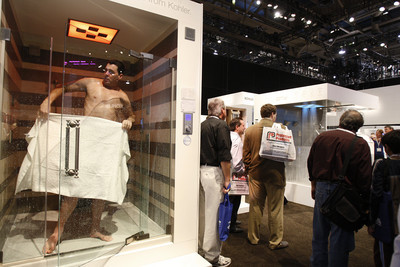THE VIEW ISN’T PRETTY: Builders attending local conference are pessimistic about economic recovery
On inauguration day for President Obama, a day filled with hope and promise, chief economists from a number of national organizations killed the joy with predictions of further doom and gloom at the International Builders Show in Las Vegas.
David Crowe of the National Association of Home Builders said he was quite negative in his housing and economic outlook last year, but not negative enough.
Housing starts dropped to about 441,000 in 2008, their lowest total since 1945 and down from nearly 1.8 million in 2006. Builders are reducing prices and adding optional features at no cost.
Interest rates are at 40-year lows and housing affordability is at its highest level since the 1970s.
None of that matters when people fear for their jobs and are afraid to commit to a major purchase such as a car or a house, Crowe said.
"We have consumer confidence at or near a historic low," the economist said Tuesday at the building industry trade show, "and it will probably deteriorate in 2009."
The S&P/Case-Shiller Home Price Index fell 25.3 percent from March 2006 to October 2008.
Crowe said he expects prices to fall 29 percent more this year and new-home sales to decline 14 percent.
Delinquency rates on home mortgages have risen significantly and are expected to go higher in 2009, Freddie Mac chief economist Frank Nothaft said. Rising unemployment is the "trigger event" for foreclosures, he said.
Credit is ample for borrowers who have equity and a good credit score, can make a down payment and can qualify for a full-documentation conforming loan, Nothaft said.
"The credit box for home mortgages and commercial mortgages has tightened over and over in the face of mounting defaults," he said.
The Federal Reserve has taken aggressive steps to keep interest rates low and has purchased $125 billion in mortgage-backed securities debt from Fannie Mae and Freddie Mac.
The basic premise behind what's happening with housing is an imbalance between supply and demand, Crowe said. The nation has an excess "overhang" of 6.2 million homes for sale, about 1.5 million too many, he said.
Portland Cement Association chief economist Ed Sullivan said any recovery probably will not materialize until 2012.
The nation lost 2.6 million jobs in 2008 and Sullivan projects another 5.8 million jobs will disappear in the next two years.
Obama's proposed $775 billion economic stimulus package may not be enough to pull the country from the depths of recession, Sullivan said. He estimates the plan would require $1.2 trillion to restore employment to January 2008 levels.
Stabilizing labor markets and job creation by way of increased infrastructure spending is a "critical ingredient" of that stimulus plan, Sullivan said.
An estimated $65 billion to $70 billion in "shovel-ready" construction projects could begin within 90 to 180 days, he said. Shovel-ready projects are those that have already been designed and engineered and only await funding.
The Council of Mayors has identified 76 shovel-ready projects in Nevada valued at $586 million, including roads, schools and airport construction. They would create 7,200 direct construction jobs and another 19,445 "downstream" jobs and consume 108,000 metric tons of cement, Sullivan said.
Las Vegas shows a 90 percent probability -- highest in the nation -- that home prices will be lower in two years than they are today because of the overhang of homes for sale, said David Berson, chief economist of PMI Group, a Walnut Creek, Calif.-based provider of private mortgage insurance. The risk is greater than 50 percent in more than half of all metropolitan statistical areas that prices will be lower in two years.
Mortgage default rates will be a problem for a while, he said.
"The primary reason people default is not because they're underwater, but because they can't make the payment," Berson said.
Contact reporter Hubble Smith at hsmith@reviewjournal.com or 702-383-0491.






















